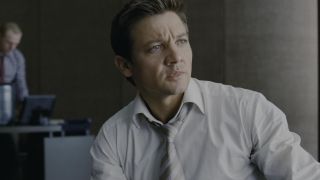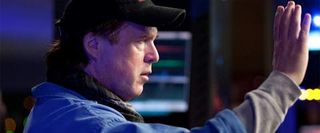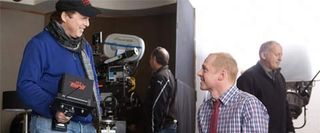Brad Bird Talks Using IMAX Over 3D For Mission: Impossible - Ghost Protocol

Between the release of Mission: Impossible – Ghost Protocol as well as the prologue for The Dark Knight Rises, the last few weeks have featured many debates about the benefits of shooting in IMAX vs. 3D. People who are fed up with wearing sunglasses indoors and believe that it doesn’t get more immersive than a 70mm print have been arguing that the real future of cinema is the super big screen that only IMAX can provide. So you might find yourself asking, “What does Brad Bird, the director of the new Mission: Impossible film, have to say about the debate?” I was wondering the same thing when I had the chance to sit down with the filmmaker one-on-one a few weeks ago.
Below you will find my conversation with the first-time live-action feature director, who talks about not only the use of IMAX over 3D, but the importance of character, continuity within the Mission: Impossible franchise, and how medium will affect his project selection process going forward.
When did you decide that you wanted to make a live action film, and how did you choose a film from the Mission: Impossible franchise?
Well, I started making films at a pretty early age. I was eleven when I started making my first animated film and 13, almost 14 when I finished that film. So it actually took me three years to make. And in the process of making it, I had to decide what things I wanted to animate in close-up and what's a medium shot, what's a pan, so I had sort of a rudimentary learning about film. But once I started paying attention to that stuff, I started seeing it in the live action movies that I was watching. And I started noticing that certain directors were consistently giving me these intense feelings. The first one that I remember was Hitchcock, because my parents kept saying, “This is Hitchcock”. And I recognized that this chill was going up the back of my neck whenever there was a Hitchcock film. So I started, like, “Why is Hitchcock able to get those moments?” Why can Hitchcock get them and others can't? And then once you get into that you start noticing, “Wow, Liam McCarey is really connected with good comedies, and Howard Hawks has really got tough women down”, y'know what I mean? And David Lean has sweep and romance and epic quality... And that made me interested in doing live action almost as, well before I was even finished with my first animated film. So I've always been looking for an opportunity to do live action. I've written for live action, I've storyboarded a couple of live action things, and it's been a very belated coming to live action, but I've been meaning to for a long time. But a lot of people think it means that I'll never do animation again, and animation's to cool to not return to it. I just want to be driven by what I'm most passionate about at the moment and I have stories, that, some are best suited to live action and some are best suited in animation.
Going forward, do you think that medium will dictate how you approach new projects?
I would say the project determines the medium and I don't have hard and fast ideas of what kind of stories animation should tell vs. live action, because I think animation can tell any kind of story. And I think live action can too. There used to be this divide, and I think it's evaporating. But I think the way that you tell stories has to change from medium to medium.
And that your slant is different. I mean, several people have pointed out to me that The Incredibles, the script, could have been a live action film and absolutely it could have, but it wouldn't be the way I imagined it, y'know? I imagined it being in animation. And any other version would be, “Ehh, I don't want to see that, I want to see the animated version”. And there are other things that are absolutely perfect for live action and I would want to see them in animation. That doesn't mean that they couldn't be done, but it's not the way I see it. So I think I'm driven by the story first and foremost and then which way to tell the story is next. But I hope to mix it up.
CINEMABLEND NEWSLETTER
Your Daily Blend of Entertainment News

And just as you said, I think the thing about that line blurred, I think a lot of that is Pixar, because they put such an emphasis on story and they're not only placating to the younger audiences.
Oh yeah, absolutely.
And frankly, people that I've talked to at Pixar, it seems like they go by a guiding principle that story always goes first. And when it came to the story, there's so many action films these days that completely ignore story, and I'm curious, in the making of this film was that your number one priority?
Well it is, but it's not exclusive to this film. All my favorite action films are rooted in character. One element that I've found in common, whether it's Die Hard or Raiders of the Lost Ark, which is one of my favorite films, is that you have to connect with the character. And people focus on the spectacular explosions or stunts, but the reason they're spectacular is because you care. And a lot of movies do spectacular stunts, the best ones that money can buy, and you don't give a rat's ass because you don't care about the guy that's jumping out of the fireball or girl jumping out of the fireball. The best special effect you can have in a movie is believing in a character, whether it's animated or live or whatever. It's the character that gets you there. And if they care about the character, then you can do anything you want with the character and you have the audience in your hands.
Could you talk about Ethan Hunt specifically?
Well I think Tom is a star for a reason. He absolutely 100 percent gets invested into the character. And we have other amazing actors, Jeremy Renner's in this and he's fantastic, and Simon Pegg, and Paula Patton, and they all have very different rhythms from each other. But Ethan Hunt as a character in this film is put in a weird position because he doesn't pick his team. And in all the other films he very specifically picks the team and is very much in control. And this film he is stuck with a team, and the team is cut off from the IMF and it goes into Ghost Protocol, which means they're cut off, the IMF basically ceases to exist. They cease to exist and that's why they say “Ghost”. And they're on their own. So not only is he stuck with a team of people that he didn't pick, but now he's cast adrift with them in very dangerous waters. So, uh, it was ripe for all kinds of popcorny goodness.

Just to talk about the Burj Khalifa scene, I honestly got vertigo. I thought I was going to fall into the screen. How nerve wracking was it filming that scene? I mean, when you're that high up it can't exactly be calming.
Uh, no it's not calming but the set pieces is one of the things that attracted me to the movie. And then having an actor who is basically fearless for doing that kind of stuff is icing on the cake. The fact that Tom will do that stuff; not only will he do it, but he loves it; that's just wonderful. Staying focused was a challenge though, because there were a lot of elements that could have gone wrong. We had unbelievable access to that building, thanks to the people of Dubai. So we were able to take out windows and take these big IMAX cameras out there, but man, when it was over everyone unclenched. It was like they'd survived a war. And the only one who was unhappy was Tom because he had to come down from the building. (Laughs) He's like a kid with the ultimate tree house.
Also, to talk about the IMAX a bit- first off, it adds so much to that whole sequence, and I love that it's pushing the boundaries of what you can see in an action film. But one thing I'm really curious about is that it's in IMAX, but unlike most action movies/blockbusters these days, it's not in 3D. And I'm curious about that decision.
Well, there was some pressure to do 3D, particularly a year ago. But people are seeing that there are other ways to have showmanship. For me, I'm very interested in 3D, I loved Avatar. I'm very interested in increased frame rates, which Peter Jackson's playing with. But right now, for me, if you're going to use the word “immersive”, which everybody is throwing around right now, there's nothing more immersive than a really big ass screen. And if you get an image of unbelievable clarity and sharpness on a really big screen, I think you, well just like you said, feel like you're going to fall into the screen. And I think that in this rush to give the audience something special, we're losing the fact that just having a really big, sharp image is the best presentation that you can have. When it fills your field of vision, it's something to behold. So I pushed very hard to shoot several sequences in IMAX and luckily Paramount and everybody went along with it.

Can you talk about the decision to release it in IMAX prior to the wide release?
Right, for five days, which is stunning that they went along with me on that. I wanted it to be a little longer, but I'm amazed that I got five days because every studio on the planet wants to have the biggest opening number. And you can't have the biggest opening number when you're only on a few hundred screens, but I argued with them that the most valuable kind of advertising, the kind that's hardest to get, is word-of-mouth. And that if all the first viewers of the film see it at it's very best, you're going to get the very best word-of-mouth. And they went along with that, and I applaud their courageousness because we won't be able to brag about getting the biggest number. We physically can't do it if we're going to do this. But we will have the best presentation and all the first people that see this movie will see it at its best.
I also want to ask about your approach, just from the franchise point of view- at this point there have been three different films, all from three different directors, but more importantly, in terms of some franchises there's not a lot of continuity when it comes to this. You have similar characters that bridge the gaps, but you're not necessarily constantly referencing the older films. And I'm curious how that affects your approach.
Well, we're actually the first Mission: Impossible that has a little tiny bit of carry-over. First of all, Simon Pegg had a very small role in the last Mission: Impossible and he was so memorable in it that JJ and Tom were determined to have him have a big role in this film. So he was in place when I came onto it, and I was really happy about that because I love Simon Pegg. But there also is one little story element that carries over a little bit. But I think that everyone, Tom especially, was concerned that each movie stand on its own as a movie experience. So it's not important that you've seen the last movie or any of the Mission: Impossibles to enjoy this one. That said, if you did see the last Mission: Impossible, which is my favorite one because it was emotional, there is a story element that's pretty important that carries over.

Eric Eisenberg is the Assistant Managing Editor at CinemaBlend. After graduating Boston University and earning a bachelor’s degree in journalism, he took a part-time job as a staff writer for CinemaBlend, and after six months was offered the opportunity to move to Los Angeles and take on a newly created West Coast Editor position. Over a decade later, he's continuing to advance his interests and expertise. In addition to conducting filmmaker interviews and contributing to the news and feature content of the site, Eric also oversees the Movie Reviews section, writes the the weekend box office report (published Sundays), and is the site's resident Stephen King expert. He has two King-related columns.
Most Popular






